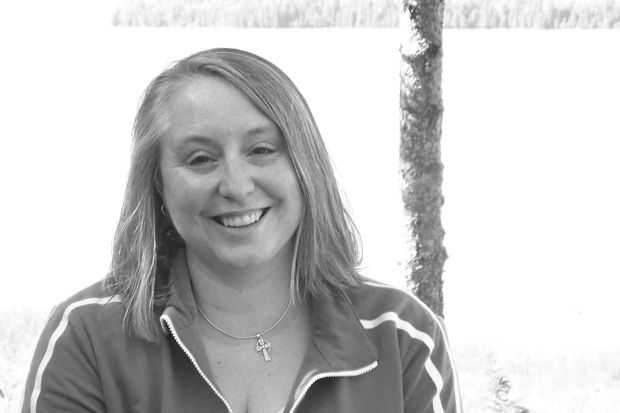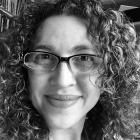What does your life look like?
I am full-time faculty in the School of Nursing at North Park University and I serve as a nurse one evening a week at a homeless shelter for men on the south side of Chicago. I’m also pursuing my PhD in urban studies at UW–Milwaukee and am a wife and mother of two.
How did you come into your field of study?
I always wanted to be a nurse. In my junior year of college, I had an incredibly transformative experience on a missions trip to Haiti. This was 1987, so right after Duvalier was overthrown. I had barely been out of the Midwest, let alone the country, and I went to the poorest country in the western hemisphere, where they had just had a coup. In Haiti, God spoke to me clearly about nursing and caring for the poor.
I had had maybe three nursing courses by then, so I asked if I could volunteer in the medical clinic. I turned out to be the most qualified person there. It was the genesis of my social consciousness and a pivotal moment in my life’s direction.
Being a typical white American middle-class person, I assumed this meant going into missions. I looked actively for opportunities to return to Haiti, but my plans kept getting thwarted — the political situation was so volatile, it seemed like every time I tried to return, there was a coup. So, I started questioning whether God truly wanted me overseas. Then I saw an ad for Healthcare for the Homeless, and that turned out to be the answer for me. I’ve worked with Healthcare for the Homeless for twenty years, along the way getting married and having two children.
When my youngest child, Ian, was six months old, he was diagnosed with cystic fibrosis. So I took a year off, and wondered again, “What am I supposed to be doing?” Around that time, I saw an ad in the paper for an adjunct teaching job at North Park University for community health. So, I tried it and loved it. It’s amazing because I have two professions that are meaningful, that I’m good at, and that I love.
Tell me about your work with Healthcare for the Homeless.
I practice as a nurse practitioner one evening a week at a shelter for homeless men. Most of these men don’t have access to healthcare at all. We meet in the basement of a church at a set of conference tables: I sit at one end, Tom (another healthcare worker) sits at the other. We have a bag of medications in the middle, and we do primary care: limited physical exams, maintenance and diagnosis of acute and chronic illnesses — anything from colds, high blood pressure, diabetes, and everything in between. We don’t do real physical exams at this location, but I’ve done that before. I’ve joked that I’ve done pelvic exams in closets.
What do you enjoy most about your work?
I love teaching undergrads. You get a chance not just to teach them how to be good nurses, but to impact how they view the world, how they view people, how they treat people. I tell them, “If you don’t remember anything else, remember this one thing: treat everyone with respect. I don’t care what they’ve done or how they are responding to you. You need to be God’s emissary with everyone, no matter what.”
In teaching, I love “aha” moments, when students have a revelation because of something I’ve said. I also love shocking students out of a moment of sleepiness with some good stories. I remember recently teaching about “evidence-based practice,” and the students were starting to fade. So I said, “Over at Swedish Covenant Hospital, they are trying something new in wound care because of evidence-based practice. They’re using maggot-therapy.” That woke up the class!
In terms of my nursing practice, I cherish the success stories of the homeless people I work with. They are few and far between and you learn to hold onto them dearly. Most of the time, when people don’t come back, you don’t know if they’re dead or if they’ve been housed. I enjoy having an equal exchange with a patient, making a real human connection with a person.
How does your faith connect with your study/work?
I think as a nurse, it’s easy. In every major religion, there is a call to take care of the sick. We get to do this and get paid for it on a daily basis!
What would you like Christians to understand about your field?
I would like them to understand more about the homeless people I work with. Most of them work. They aren’t all lazy, as some would like us to believe. They are children of God deserving of kindness and respect, just as worthy as all of us. They are funny, and they are people. One of the guys I’m working with right now used to be in the Negro League, and he has amazing stories. Even when you encounter someone begging on the street, the best thing you can do is make a personal connection — look in their eyes, treat them like a real person. Whether you give money or food or nothing, treat them with dignity.
What would you like to ask someone who is a few years farther along in your field?
I’d ask, how do you find the balance between practice and teaching? I think that is one thing that is unique to nursing. I have to practice to keep up my license; if I lose my certification, I can’t teach nursing. So, finding that balance is tricky.
What would you like to be doing ten years from now?
The same thing I’m doing now: teaching, and working in homeless centers. I’d like to be done with my PhD. Years ago, I started a research project about the homeless, chronicling some of the amazing stories I come across. Sadly, I lost all of my data through theft after months of work. I’m really glad to have a chance to work on this project again through my PhD program. I’m hoping it will flesh out some of the quantitative data available on the homeless, humanizing it with real stories. I’d also love to develop a course on urban health at the university. And I’d love to travel more!
What is the latest book you’ve read for pleasure or outside of your field of study or what book would you like to recommend?
I recently read Polio: An American Story by David M. Oshinsky — a great book [winner of the 2006 Pulitzer Prize for History]. I love reading about the history of disease and how it affects culture, how it changes the way people live. This one was really fascinating. I’m also reading the new Janet Evanovich. And I love adolescent fiction.
What piece of advice would you offer to a student seeking to follow your career path?
Don’t assume you know what God wants you to be doing. You might have an idea, but then it may change, and you have to be willing to listen for that.




